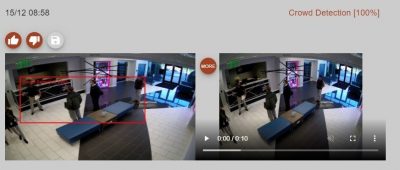
Photo: Peachtree corners Cawamo
AI cameras monitor COVID safety compliance in Peachtree Corners
29 January 2021
by Sarah Wray
Peachtree Corners in Georgia is deploying AI-powered video analytics technology at City Hall to automatically detect when someone is not wearing a mask or a group of people are not observing social distancing guidelines.
The city is the first in the United States to use the object detection technology from Cawamo which uses existing cameras.
Brandon Branham, Chief Technology Officer and Assistant City Manager, Peachtree Corners, told Cities Today: “We see this as a way to use data to help us in our communication strategy, not an enforcement tool. If we are seeing a lot of alerts in a certain area, maybe we need to adjust signage to remind people or put in better signage.”
The system does not use facial recognition or any personal identifiable information. A press release noted that “combined on-site edge and cloud AI technologies work together to generate high-quality, accurate alerts with virtually zero false alerts”.
Cawamo also offers detection analytics for issues such as fire and smoke, parking compliance, “suspected robbery”, people and vehicle counting, and more. However, Branham says the technology’s use in Peachtree Corners is limited for now.
“The deployment is currently only in our public spaces of City Hall, where there is a higher potential for risk,” he said. “With the technology being easily deployable it could lend itself to other areas, but it is still too early in the evaluation process to know that.”
The system can be used with any existing camera or digital/network video recorder (DVR/NVR).
Growing area
According to analysts, the global video analytics market is expected to increase from US$4.9 billion in 2020 to US$11.7 billion by 2025, with smart cities tipped as a key growth area.
Cities beyond the US, including in France and the UK, have also used video analytics software to monitor social distancing and mask-wearing during the pandemic.
As use cases grow, concerns have been raised about how such AI systems take surveillance to a new level.
Jay Stanley, senior policy analyst with the American Civil Liberties Union (ACLU) and author of the Dawn of Robot Surveillance report, published in 2019, noted that: “Cameras that collect and store video just in case it is needed are being transformed into robot guards that actively and constantly watch people.”
The ACLU report calls on policy-makers to “contend with the technology’s enormous power, prohibit its use for mass surveillance, narrow its deployments, and create rules to minimise abuse”.
Branham said: “I think it’s very important that cities don’t overextend our reach as we start to deploy newer technology. We should be using technology to better the lives of our residents and businesses, not track their behaviour.”
“One of the key components when we evaluate companies to test as part of Curiosity Lab, is their data collection standards and the type of data that is being collected. We do not allow for any company to use facial recognition, and this was a big part of evaluating the Cawamo project. We wanted to ensure the technology was only doing what it claimed it did, which to date has been true,” he added.
The video analytics system joins other advanced technologies deployed at Peachtree Corners’ Curiosity Lab real-world testing environment, including remote-controlled scooters, a solar roadway and an integrated smart city management system.







